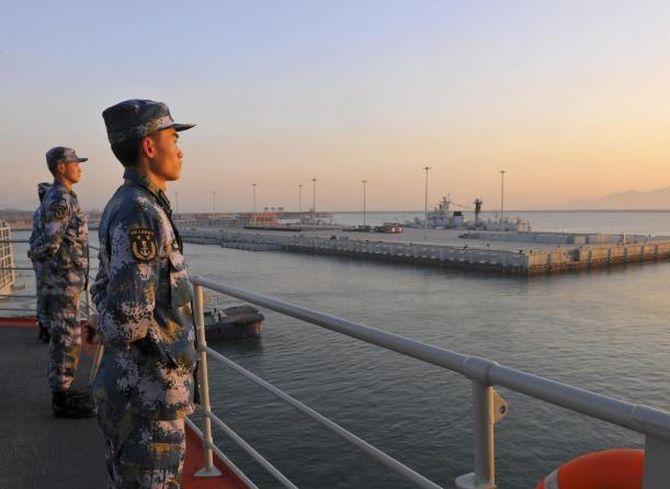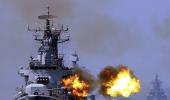A defiant China on Wednesday said the UN-backed tribunal's verdict should be "dumped into garbage" and asserted that it has the right to declare a unilateral air-defence zone over the strategic South China Sea after its expansive maritime claims in the region was shunned by a five-member international jury.

"Rejecting international appeals to implement the verdict, Defence Minister General Chang Wanquan said China will not accept any proposition or action based on the decision by the arbitral tribunal.
"China's territorial sovereignty and maritime interests in the South China Sea will not be affected by the ruling under any circumstances," Chang said in Beijing.
China has refused to abide by the ruling of the Permanent Court of Arbitration tribunal in The Hague. It has said the Philippines' claim over parts of the SCS is groundless from the perspectives of either history or international law.
"The Chinese navy can operate in South China Sea at any time as the area belongs to China. Certain country has sent aircraft carrier fleet to the South China Sea," Assistant Foreign Minister Liu Zhenmin said.
"We do not recognise or implement the award. We hope it is only a white paper and it will not be enforced. Just dump it into garbage or put it in a shelf or put it in archives and let us come back to the track of negotiations," he said.
He said that China hopes to go back to the negotiating table with the Philippines.
"This is the policy of the Chinese government and hope that neighbouring countries in the South China Sea and ASEAN countries jointly uphold peace and stability of the South China Sea and freedom of navigation and over flights," he told reporters.
As to whether China will set up an Air Defence Identification Zone over the SCS to force aircraft flying in the area to seek permissions from Beijing, the assistant foreign minister said China "has the right to do so."
"We have set up one over the East China Sea (close to Japan) and whether we will set up another in South China Sea will depend on the degree of threat we are facing. If threatened enough, we will do so but it will depend on a host of factors," Liu said at the nationally televised conference.
"Do not make it a region of war," he warned.
Releasing a strongly-worded "white paper" rejecting the verdict of the Hague-based Permanent Court Arbitration, Liu launched a frontal attack on the international tribunal and its judges, saying they "manipulated" their judgement.
"Can we really trust this tribunal to be fair and to be credible. Some people of a country are saying that the award should has a binding force and should be enforced," he said in an apparent reference to US assertions that the ruling is binding and China should implement it.
"This is lie. This tribunal and the award has no credibility," he said.
The tribunal has said its verdict is binding.
"Why would anyone enforce it? If a tribunal wants to win other people's respect, it should behave properly," Liu said, adding that it is not a tribunal under the international law.
"It has no relation to the international court in the Hague and the UN system. It has some ties with the International Tribunal of the Law of the Seas. It does not belong to the same system as PCA. Because the permanent court provides secretariat services that is it," he said.
Asserting that the composition of the tribunal was a "political manipulation", Liu specially targeted Japanese jurist Shunji Yanai who had appointed four of the five judges.
Liu said Yanai worked as Tokyo's diplomat in the US and was close to Japanese Prime Minister Shinzo Abe.
He also hit out at the five tribunal judges -- Thomas A Mensah of Ghana, Judge Jean-Pierre Cot of France, Judge Stanislaw Pawlak of Poland, Professor Alfred H A Soons of the Netherlands, and Judge Rüdiger Wolfrum of Germany.
Except Rüdiger, who was picked by the Philippines the other four were picked by Yanai, the President of the International Tribunal for the Law of the Sea.
Liu said Yanai is the chairman of Japanese advisory panel on the reconstruction of legal basis for security and he is still advising Abe on Japan's right to self-defence.
"So he manipulated the arbitral tribunal and continues to exert influence on the operation of the tribunal. As you can see four of the five judges come from Europe, one from Africa, Ghana, but lives in Europe," he said.
This was not the first time Liu attacked Yanai. Days before the verdict, Liu wrote an article in the ruling Communist Party of China's mouthpiece 'Qiushi' casting doubts on the make-up of the tribunal.
One of the judges Yanai appointed included a person who had ruled against a party holding a position similar to China in a previous case, Liu had wrote.
"Leaving aside the obvious violation of procedural justice, we can hardly make a better explanation of Judge Yanai's motivation and purpose other than that he did it on purpose," Liu has said.
Yanai has defended himself in an interview to 'Japanese Times' saying he had to appoint the judges as ITLOS President.
"I just happen to be a Japanese, but the annex to the convention provides that in case the arbitrators are not appointed by the parties or by agreement by the parties then the president of ITLOS must do it," Yanai said.
"I followed exactly these provisions. As the president of ITLOS, I didn't act as a Japanese representative. I don't represent the Japanese at all in the tribunal. That is quite obvious."
He said China could have chosen an arbitrator for the tribunal, but instead Beijing decided to ignore the process.
"So in this case, I had to do the job," Yanai has said.
On Wednesday, Liu said some of the judges of the tribunal have pre-existing opinions. "They lead us to believe that they are supportive of certain views but after the arbitration was established what they advocated went against what they expressed in their previous articles and statements," he said.
"So this makes us question whether they can stay true to their real belief," he said. "Who is really behind the arbitral tribunal? These judges are paid and who paid them. Is is it the Philippines or some other country. So the mechanism in the tribunal is completely different from the ICJ or the international tribunal of the law of the seas," Liu said.
"The judges are paid by the UN to ensure they fairness. But this arbitral tribunal judges are paid probably by the Philippines and some other country we don't know. They are paid for their service," he questioned.
"So this case is the first compulsory arbitrary tribunal established under UNCLOS. But it went against the expectations of the founders of the UNCLOS and created a very bad precedent," he said.
Liu expressed the hope to reopen talks with the new government of Philippines headed by Rodrigo Duterte. The petition was filed by previous Philippine government headed by President Benigno S Aquino.
Image: Chinese naval soldiers stand guard on China's first aircraft carrier Liaoning, overseeing the South China Sea. Photograph: Reuters











 © 2025
© 2025